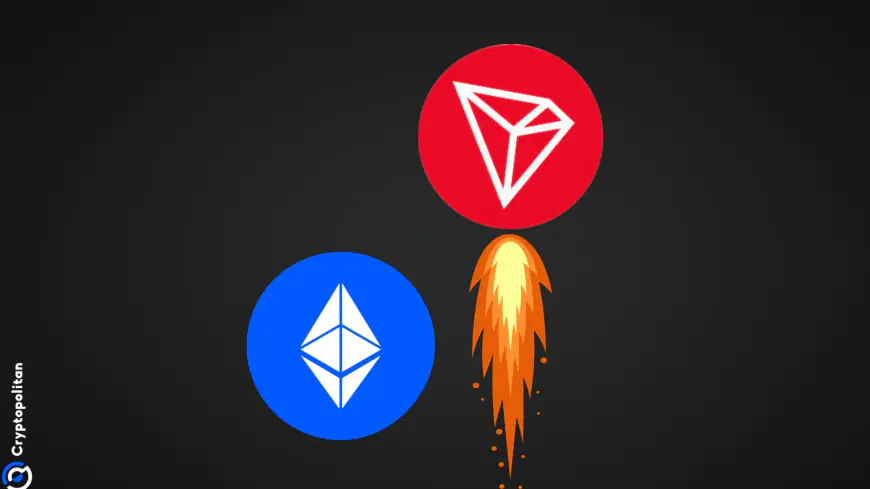TRON turned deflationary in the past year, surpassing Ethereum with token burns
TRON is turning into a deflationary network, after token burns accelerated in the past year. The chain surpassed Ethereum (ETH) in a bid to turn into a form of deflationary money. TRON (TRX) diminished its supply through regular token burns and is now one of the strongly deflationary networks. The regular TRX burns continued to […]

TRON is turning into a deflationary network, after token burns accelerated in the past year. The chain surpassed Ethereum (ETH) in a bid to turn into a form of deflationary money.
TRON (TRX) diminished its supply through regular token burns and is now one of the strongly deflationary networks. The regular TRX burns continued to decrease the supply at a gradual pace in the past 12 months.
For 12 months, TRX decreased its supply from 88.89B tokens to 85.6B, for a total annualized deflation of 2.93%. The supply of TRX is already significantly down from its 101B peak in 2022, signalling a shift in tokenomics. TRX also had a cliff burn in 2022 before continuing with its supply-cutting program.

The accrued deflation puts TRX close to the deflationary token narrative. BNB Chain uses a similar schedule of burns, achieving a 1.1% deflation on average. The other class of deflationary tokens includes some of the leading memes like SHIB or PEPE. Some tokens also go for voluntary burns or lockups in a bid for scarcity and higher token valuations.
Initially, TRX worked as a high-supply token, drifting with a minimal price. With time, the utility of TRX expanded, both for simple transactions and for liquidity, DeFi and other features. The TRON chain deflation is currently the opposite of tokens with infinite unlocks or rapid mining.
At the same time, other L1 like Ethereum and Solana continue with a predetermined inflation and adding new supply. On Ethereum, the inflation is just 0.32%, down from a recent high of 0.74%. Solana has an effective rate around 5% per year, with faster unlocks expected in early 2025 based on a cliff unlock schedule. New SOL is also added linearly every day, adding to the annual inflation.
TRX revisits peak price levels
The deflationary chain helped the TRX price break out from years of sideways trading near its lower range, and possibly claim a permanently high price level. The other factor is the growing liquidity on the TRON chain, especially the minting of USDT.
TRX traded at $0.1606, just below its 2021 bull market peak, and on track to revisit the first 2017 rally after the project’s token sale. This time, the TRON rally is more sustainable, with gradually growing trading volumes above $305M daily.
TRX also had to fight skepticism about the chain’s traffic and the existence of scam apps. TRON built its own ecosystem of Web3 games and DeFi, growing to $7.40B in total value locked. TRON’s own reporting puts the value locked at a much higher level, above $16B, surpassing the asset’s market capitalization. Additionally, the supply of USDT on TRON is at $61.79B, making up around 50% of the stablecoin’s weight. TRON also has more numerous USDT holders, as more than 90% of all the stablecoin’s wallets were created on the TRON network.
With that metric, TRON surpasses Solana, carrying $5.71B in value locked. TRON also has a more favorable ratio of token market cap to value locked. TRX has a total capitalization of around $13B, while SOL is capped at $67B, and is considered overvalued based on value locked and the production of fees.
TRON is also producing more than $20M in monthly earnings regularly, retaining some of the earnings while also paying to validators. Solana has negative earnings each month, due to its incentive structure.
In the year to date, TRON drew in $1.42B in fees, though still surpassed by Ethereum with $1.97B. The balance may flip next year, as Ethereum moves away from its high-fee era and reflects the new lower payments to L1 block producers.
In the short term, TRX may gain interest from speculative traders. Open interest for TRX is near a one-month high at $91M.
The other boost for the TRON ecosystem may come from the launch of a native version of Wrapped BTC (WBTC). Additionally, Justin Sun, co-founder of the network, has been investing aggressively during the bear market. Sun continues to boost new tokens and emerging meme token trading on TRON. The ecosystem, however, has been met with some skepticism, due to suspicions of insider trading, bot activity and uncertain reserves and token creation.
What's Your Reaction?









































































































